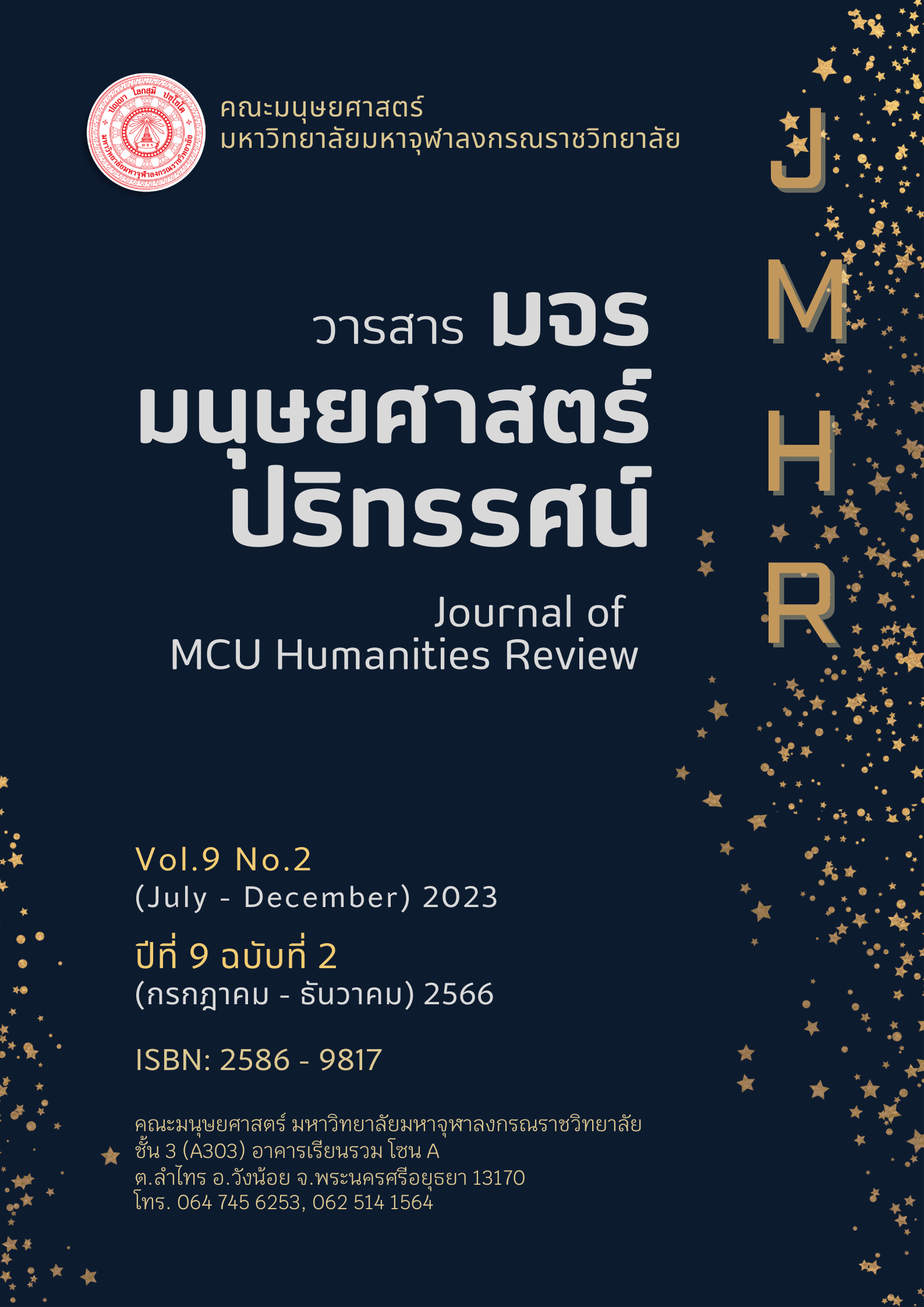การจัดการความเครียดในคนวัยทำงานโดยการสร้างสุขตามแนวพุทธจิตวิทยา
คำสำคัญ:
ความเครียด, คนวัยทำงาน, การสร้างความสุข, พุทธจิตวิทยาบทคัดย่อ
การจัดการความเครียดในคนวัยทำงานโดยการสร้างความสุขตามแนวคิดพุทธจิตวิทยาซึ่งเป็นปัญหาสำคัญมากสำหรับคนวัยทำงานในสถานการณ์ปัจจุบัน เนื่องจากสภาวะผลกระทบจากโรคไวรัสโคโรน่าจนถึงปัจจุบัน ที่ส่งผลกระทบต่อประชากรวัยทำงานที่ต้องเผชิญกับความเปลี่ยนแปลงของสภาพเศรษฐกิจที่ไม่มั่นคง การลดเงินเดือนตกงาน การขัดแย้งทางการเมือง และสภาพสังคมการแข่งขันที่สูงขึ้น ส่งผลกระทบปัญหาสุขภาพกาย ปัญหาครอบครัว สัมพันธภาพเปราะบาง เกิดความขัดแย้งได้ง่าย ซึ่งส่งผลกระทบต่อประสิทธิภาพและความกดดันในการทำงาน ทำให้เกิดความเครียดเรื้อรังและทำให้ความสุขในการทำงานลดลงด้วย การจัดการความเครียดจากการรับประทานยาคลายเครียดแล้ว ได้นำแนวทางการจัดการความเครียด ได้แก่ โดยวิธีการผ่อนคลายความเครียดการฝกผอนคลายกลามเนื้อเพื่อลดความเครียด ทําใหเกิดการเปลี่ยนแปลงดานรางกาย จิตใจ พฤติกรรมและความคิด สงผลใหบุคคลมีความเครียดลดลง และนำแนวทางการสร้างความสุขบูรณาการร่วมกันระ 8 แนวทาง ได้แก่ 1) การค้นหาจุดดีของตนเอง 2) ค้นหาจุดดีของผู้อื่น 3) เพิ่ม 3 อ. ออกกำลังกาย อาหาร อารมณ์และขจัดสุรา สารเสพติด บุหรี่ 4)การสร้างครอบครัวอบอุ่น 5) จัดสมดุลชีวิต ด้วยหลัก 8-8-8 6) การมีจิตอาสาและทำประโยชน์แก่ผู้อื่น 7) การมีเครื่องยึดเหนี่ยวจิตใจ และ 8) ความพึงพอใจในสิ่งที่ตนมีเพื่อเห็นคุณค่าของสิ่งที่มีอยู่ ทำให้คนวัยทำงานมีแนวทางในการส่งเสริมสุขภาพใจของตนเอง ครอบครัวและคนรอบข้าง เพื่อให้คนวัยทำงานมีสุขภาพจิตที่ดีปรับตัวได้ ความเครียดลดลง และมีความสุขเพิ่มมากขึ้น เพื่อให้เกิดการทำงานร่วมกันอย่างมีประสิทธิภาพ การจัดการความเครียดในคนวัยทำงานตามแนวพุทธจิตวิทยาจะเป็นภูมิคุ้มกันทางใจของคนวัยทำงานในการทำงานอย่างสมดุล ผ่อนคลายและมีความสุข ช่วยสร้างสุขภาวะที่ดีขึ้นต่อไป
เอกสารอ้างอิง
กรมสุขภาพจิต. (2560). โปรแกรมสร้างสุขวัยทำงานในชุมชน. กรุงเทพฯ: สำนักส่งเสริมสุขภาพจิต กระทรวงสาธารณสุข.
กัลยาณี เสนาสุ. (2559). ปัจจัยที่มีผลกระทบต่อความสุขของคนไทย. กรุงเทพฯ: สถาบันบัณฑิตพัฒนบริหารศาสตร์.
พระเทพโสภณ (ประยูร ธมฺมจิตฺโต). (2548). โรงเรียนวิถีพุทธในสังคมไทย. กรุงเทพฯ: มหาจุฬาลงกรณราชวิทยาลัย.
พระธรรมปิฎก (ป.อ. ปยุตโต). (2543). ความสุขที่ไม่ต้องแสวงหา ประโยชน์สูงสุดของชีวิต.กรุงเทพฯ: ธรรมสภา.
พระพรหมคุณาภรณ์ (ป.อ.ปยุตฺโต). (2545). พุทธธรรม ฉบับขยายความ (พิมพ์ครั้งที่ 11). กรุงเทพฯ: โรงพิมพ์ บริษัท สหธรรมิก จำกัด.
“________”. พจนานุกรมพุทธศาสตร์ ฉบับประมวลธรรม (พิมพ์ครั้งที่ 13). กรุงเทพฯ: บริษัท เอส.อาร์.พริ้นติ้งแมสโปรดักส์จำกัด.
ปราโมทย์ สุคนิชย์ และ มาโนช หล่อตระกูล. (2540). จิตเวชศาสตร์รามาธิบดี (พิมพ์ครั้งที่ 2). กรุงเทพฯ : บียอนด์ เอ็นเทอร์ไพรซ์.
ยงยุทธ วงศ์ภิรมย์ศานติ์. (2560). สร้างสุขด้วยสติในองค์กร (Mindfulness in Organization: MIO). กลุ่มที่ปรึกษากรมสุขภาพจิต กระทรวงสาธารณสุข, กรุงเทพฯ : บริษัท บียอนด์พับลิสชิ่ง จำกัด.
สมภพ เรืองตระกูล. (2549). ตําราจิตเวชศาสตร์ (พิมพ์ครั้งที่ 9). กรุงเทพฯ: เรือนแก้วการพิมพ์.
สุภาณี สุขะนาคินทร์. (2549). ปัจจัยที่มีความสัมพันธ์กับความสุขของประชาชน อำเภอ ท่าปลา จังหวัดอุตรดิตถ์ (วิทยานิพนธ์ศิลปศาสตรมหาบัณฑิต). มหาวิทยาลัยราชภัฏอุตรดิตถ์ : อุตรดิตถ์.
สัมพันธ์ คงพูนทรัพย์. (2560). การใช้หลักพุทธธรรมในการทำงานจิตอาสา. Journal of Roi Kaensarn Academi, 2(1), 1-14.
Manion, J., (2003). Joy at work: Creating a positive workplace. J. Nurs. Admin.
Seligman, Martin. (2002). Authentic Happiness: Using the new positive psychology to realize your potential for lasting fulfillment. London: Nicholas Brealey.
Veenhoven, R., (1996). Happy life-expectancy: A comprehensive measure of quality-of-life in nations. Soc. Indicat. Res.
ดาวน์โหลด
เผยแพร่แล้ว
รูปแบบการอ้างอิง
ฉบับ
ประเภทบทความ
หมวดหมู่
สัญญาอนุญาต
ลิขสิทธิ์ (c) 2023 วารสาร มจร มนุษยศาสตร์ปริทรรศน์

อนุญาตภายใต้เงื่อนไข Creative Commons Attribution-NonCommercial-NoDerivatives 4.0 International License.






